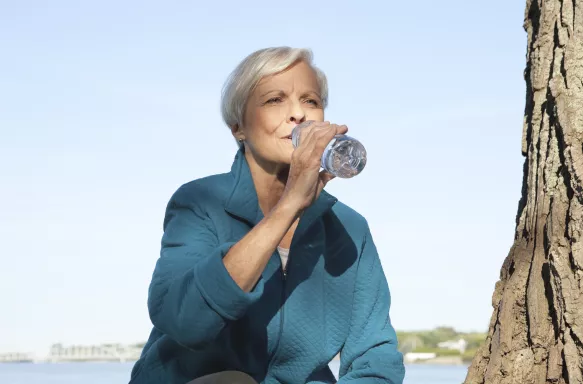Travel Health Advice – 17 Ways to Have a Healthier Holiday

Whether travelling in Europe or further afield, staying healthy while on holiday is a must.
Looking after your health is essential to ensuring you get to enjoy every minute of your holiday, whatever the destination. Even mild health issues such as indigestion, sunburn or a headache can take the shine off your experience. But holiday health advice consists of more than simply ‘don’t forget your sunscreen’ – there are tips and techniques that’ll protect you from a range of health issues and enhance your experience.
Follow our helpful travel health advice for a safe, healthy and happy holiday.

Travel Health Advice – Before You Go
See your GP – Check in with your doctor to make sure you’ve got a good supply of your regular medications for your trip, as well as asking if they recommend you taking any special meds for your destination. If possible, carry essential medication with you on the plane – that way should your luggage become damaged or lost along the way, you’ll still have your medications.
Check glasses and hearing aids – If you have hearing aids, make sure to take backup batteries. Going away with only one pair of glasses could be problematic if you lose or damage them. See your optician and get a lower-priced spare pair to avoid this scenario. You don’t want to miss out on seeing the sights on your escorted tour or river cruise.

Get your jabs – It’s standard travel health advice to check whether you need any special vaccinations for where you’re going, but it’s also a good idea to get other immunisations up-to-date. Make sure you’ve had your annual flu jab, and find out when you last had tetanus, too – a booster shot is recommended every ten years. Depending on your destination, you may also need malaria tablets. Check with your GP or your local travel health centre.
Give your shoes a once-over – If you’re going to be walking a lot on your holiday – such as on one of the best walking holidays in Europe – double check your shoes for wear and tear. Riviera Travel’s popular walking holidays, such as Walking in the Tuscan Hills for Solo Travellers, for example, don’t require that you wear professional hiking boots but you do need to feel comfortable in your shoes while walking for several hours. While it’s not advisable to break in new shoes while on holiday, you don’t want to find yourself having to buy new shoes while on holiday because your old ones have fallen apart.
Buy travel insurance – Travel insurance is essential, especially if travelling outside Europe. The higher cost of medical care in areas such the US, Africa, Asia and Australasia along with the lack of reciprocal medical cover arrangements means an insurance policy can save you thousands of pounds if you become ill in these regions. Don’t forget to declare any pre-existing medical conditions when buying travel insurance. While this can ramp up the price, it’s far worse to have a claim for medical expenses turned down because this was omitted from the insurance form. If travelling in Europe, don’t forget to bring your free EHIC card. It provides the same level of medical care to all EU citizens, such as free hospital treatment.
Travel Health Advice – What To Take With You
A small medical kit – Aside from your usual prescription meds, pack painkillers, digestion tablets, plasters and antiseptic cream. While many of these items will be available wherever you’re going, they could be expensive or simply not available in the form you’re used to. Better to be prepared by packing the items you know and trust.
Anti-bacterial wipes or gel – These come in handy when you’re out and about sightseeing, but can’t find somewhere nearby to wash your hands.
High-quality luggage – Travel health advice doesn’t usually cover luggage, but what you carry your clothes and carry-on items in can make a huge difference to whether you’ll suffer from neck, shoulder or backache later on. Buy or borrow a suitcase with four wheels as two wheels mean you’re still carrying some of the weight, and avoid heavy shoulder bags opting instead for something with wheels.
Pack layers – You may be heading somewhere warm, but even so nights – especially in the desert or near the coast – can get chilly. With layers, you can add or remove as much as you need, ensuring you never get a chill. A wrap or shrug is always a good idea as it can double up as a blanket over your knees or even be rolled up as a pillow. For men, a wide scarf works, too.
Travel accessories – Don’t forget your earplugs, eye mask, neck pillow and flight socks. The right neck pillow is essential – it can mean you sleep soundly on long journeys so you wake up feeling refreshed. Earplugs and eye masks can help block out any disruptive noises and light. Flight socks will help prevent blood pooling in your feet on long haul flights, lowering your risk of deep-vein thrombosis and ensuring your shoes still fit when you get off the plane.
A footrest – If your hips or knees give you trouble when you’ve been seated for a long time, you might consider taking something to raise your feet. This helps take the pressure off your hips and knees. You can get pillows as well as foot ‘hammocks’ that attach to the food tray.

Pack healthy snacks – Sometimes the flight attendants don’t bring food when you’re hungry, other times they bring food but you’re asleep. Packing a small bag of trail mix, a muesli bar or some dried fruit can keep your blood sugar levels steady. Just be sure to discard uneaten snacks when you land before going through customs – some food items such as fruit may not be permitted.
Travel Health Advice For When You’re On The Go
On aeroplanes – Use a saline nasal spray on a long flight to prevent your nasal passages drying out. Cabin air tends to be around 30% lower in humidity than most indoor environments, which can make it easier for bacteria and viruses to enter your airways, leading to colds, flu and other illnesses. Eye drops will help counteract dry eyes on a flight.

Save your skin – Protecting your skin from the sun’s rays is a given. Use a tablespoon of suncream for each limb (factor 15 or above), and don’t forget to reapply every two to three hours. Don’t forget the back of your neck and shoulders, which are common areas for sunburn. Wear a hat and loose, light-coloured clothing in hot climates.
Healthy Eating Travel Health Advice
Eat healthy – While Riviera Travel works hard to ensure that every meal included on your itinerary is made with the best ingredients and hygiene standards, take care if visiting a café, restaurant or market stall when in your own time. If buying whole fruit, wash it carefully before eating. It’s best to avoid foods that may not have been washed properly, such as salads. You are far less likely to have problems with properly cooked hot food, as bacteria will have been killed by the heat.
Go easy on the alcohol – This may not be the most welcome kind of travel health advice, but it’s important not to overdo the celebratory drinks the minute you arrive at your holiday destination, especially if suffering jet lag. Go easy for the first few nights, and drink a glass of water for every glass of alcoholic drink. You’ll enjoy the next day far more if you wake up without a hangover!

Stay hydrated – It’s easy to forget to drink as much water as you usually do when you’re travelling. Throw in hot temperatures and more activity than usual and it’s easy to become dehydrated. Dehydration effects include feeling thirsty – the first warning sign of dehydration – dark-colour urine (it should be a light straw colour), dry skin, feeling dizzy, rapid heartbeat and breathing, and even possibly fainting.
Holiday Health Advice – Start Early
Start your health travel preparations well in advance then all you need to do is count the days until you can really relax and enjoy every minute of your holiday without the worry.
If you have any questions, please do not hesitate to contact us.



